Natalie Delworth
Rev.com
Reverb: Open-Source ASR and Diarization from Rev
Oct 04, 2024

Abstract:Today, we are open-sourcing our core speech recognition and diarization models for non-commercial use. We are releasing both a full production pipeline for developers as well as pared-down research models for experimentation. Rev hopes that these releases will spur research and innovation in the fast-moving domain of voice technology. The speech recognition models released today outperform all existing open source speech recognition models across a variety of long-form speech recognition domains.
Updated Corpora and Benchmarks for Long-Form Speech Recognition
Sep 26, 2023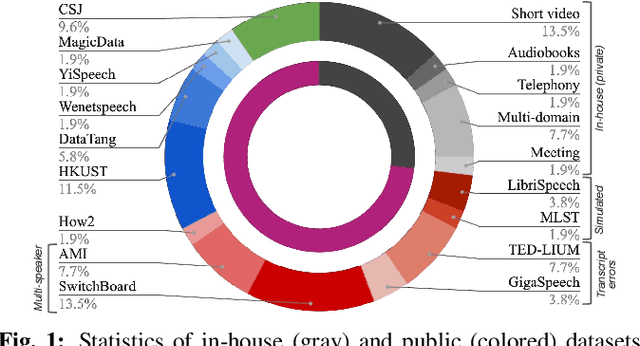
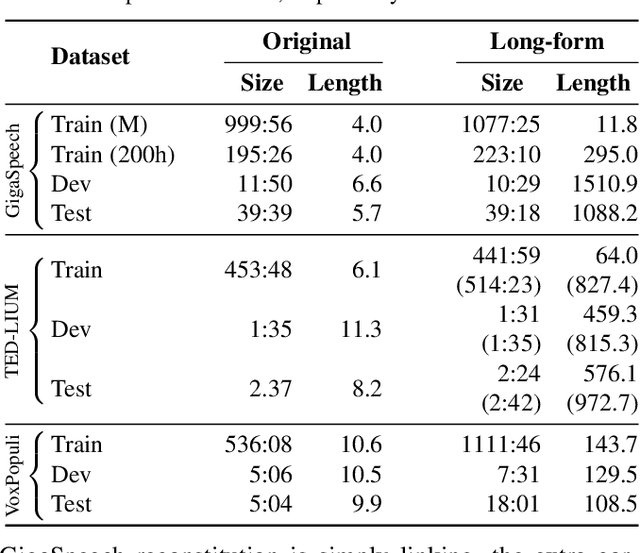


Abstract:The vast majority of ASR research uses corpora in which both the training and test data have been pre-segmented into utterances. In most real-word ASR use-cases, however, test audio is not segmented, leading to a mismatch between inference-time conditions and models trained on segmented utterances. In this paper, we re-release three standard ASR corpora - TED-LIUM 3, Gigapeech, and VoxPopuli-en - with updated transcription and alignments to enable their use for long-form ASR research. We use these reconstituted corpora to study the train-test mismatch problem for transducers and attention-based encoder-decoders (AEDs), confirming that AEDs are more susceptible to this issue. Finally, we benchmark a simple long-form training for these models, showing its efficacy for model robustness under this domain shift.
Improving Contextual Recognition of Rare Words with an Alternate Spelling Prediction Model
Sep 02, 2022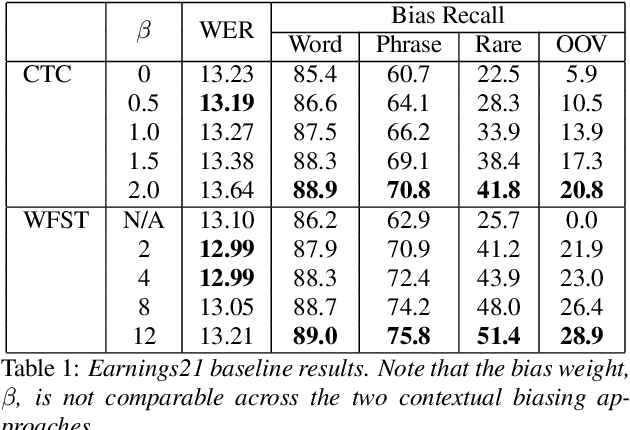

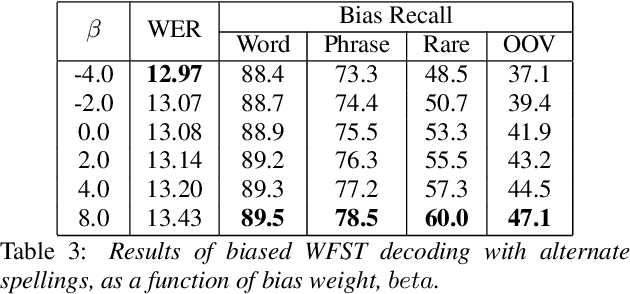
Abstract:Contextual ASR, which takes a list of bias terms as input along with audio, has drawn recent interest as ASR use becomes more widespread. We are releasing contextual biasing lists to accompany the Earnings21 dataset, creating a public benchmark for this task. We present baseline results on this benchmark using a pretrained end-to-end ASR model from the WeNet toolkit. We show results for shallow fusion contextual biasing applied to two different decoding algorithms. Our baseline results confirm observations that end-to-end models struggle in particular with words that are rarely or never seen during training, and that existing shallow fusion techniques do not adequately address this problem. We propose an alternate spelling prediction model that improves recall of rare words by 34.7% relative and of out-of-vocabulary words by 97.2% relative, compared to contextual biasing without alternate spellings. This model is conceptually similar to ones used in prior work, but is simpler to implement as it does not rely on either a pronunciation dictionary or an existing text-to-speech system.
Earnings-21: A Practical Benchmark for ASR in the Wild
Apr 28, 2021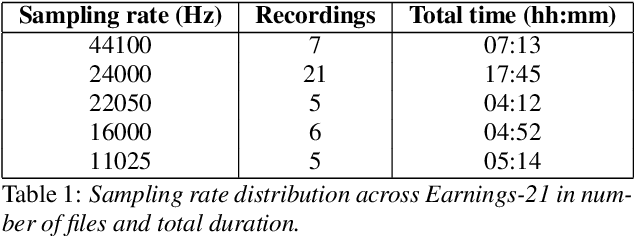
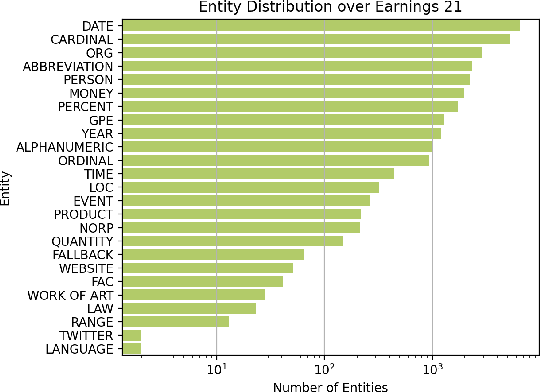
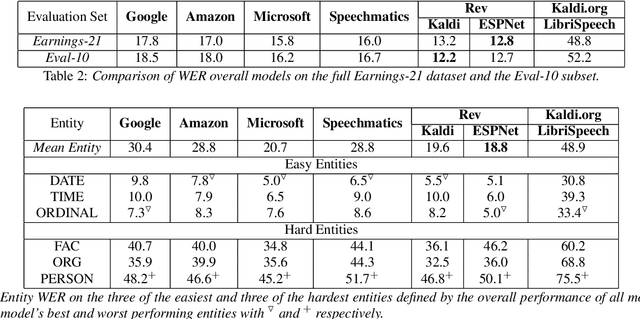

Abstract:Commonly used speech corpora inadequately challenge academic and commercial ASR systems. In particular, speech corpora lack metadata needed for detailed analysis and WER measurement. In response, we present Earnings-21, a 39-hour corpus of earnings calls containing entity-dense speech from nine different financial sectors. This corpus is intended to benchmark ASR systems in the wild with special attention towards named entity recognition. We benchmark four commercial ASR models, two internal models built with open-source tools, and an open-source LibriSpeech model and discuss their differences in performance on Earnings-21. Using our recently released fstalign tool, we provide a candid analysis of each model's recognition capabilities under different partitions. Our analysis finds that ASR accuracy for certain NER categories is poor, presenting a significant impediment to transcript comprehension and usage. Earnings-21 bridges academic and commercial ASR system evaluation and enables further research on entity modeling and WER on real world audio.
Accented Speech Recognition: A Survey
Apr 21, 2021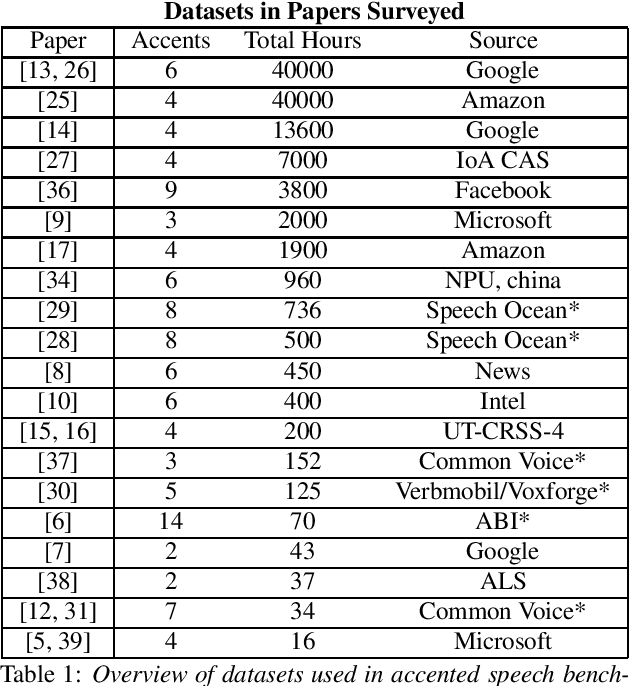
Abstract:Automatic Speech Recognition (ASR) systems generalize poorly on accented speech. The phonetic and linguistic variability of accents present hard challenges for ASR systems today in both data collection and modeling strategies. The resulting bias in ASR performance across accents comes at a cost to both users and providers of ASR. We present a survey of current promising approaches to accented speech recognition and highlight the key challenges in the space. Approaches mostly focus on single model generalization and accent feature engineering. Among the challenges, lack of a standard benchmark makes research and comparison especially difficult.
 Add to Chrome
Add to Chrome Add to Firefox
Add to Firefox Add to Edge
Add to Edge